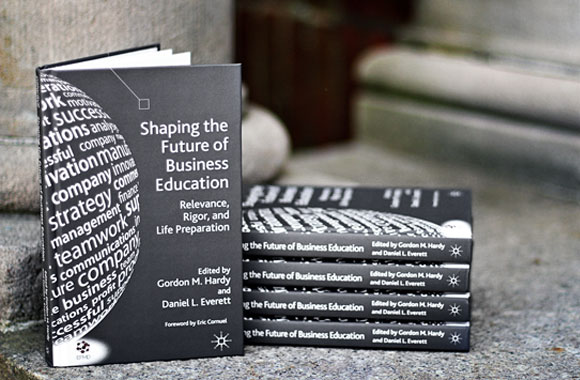
In the current national debate over the value of higher education, lines are often drawn between business education and the liberal arts. Some argue that business knowledge provides the most appropriate education for today’s world; others take just the opposite approach, elevating arts and sciences as creating supple learners who can thrive in a changing environment.
Bentley Dean of Arts and Sciences Daniel L. Everett takes exception to each mindset. Everett’s beliefs are so strong that he published a book about it.
In Shaping the Future of Business Education: Relevance, Rigor, and Life Preparation, Everett argues that fusing arts and sciences with traditional business curricula provides the best higher education. Published in May 2013 by Palgrave Macmillan, the book features the views of nearly two dozen Bentley faculty members — along with leading international educators — and the innovative steps taken at Bentley and elsewhere to promote a more holistic curriculum.
The book gives a proactive view of why arts and sciences and business training go hand in hand, and why it is crucial that universities produce the well-rounded graduates that global businesses seek.
Everett expects that the book will prove controversial in some camps of the education community.
“I think that there are some schools that believe that arts and sciences add little to the quality of a business education, and there are those in arts and sciences who believe business is not at the same level of importance for education as Arts and sciences,” says Everett. “For people who hold those perspectives it will be a controversial book, because we are saying that they are both vital to educating professionals for the future. I think that is controversial for a large section of higher education.”
Bentley experience combining these fields includes a Liberal Studies major (with seven concentrations such as Health and Industry and Media Arts and Society) that can be completed alongside a business major. Also, one-third of the coursework in Bentley’s recently overhauled MBA program is arts and sciences-based. Everett’s goal is to develop new courses that create a fusion between business and arts and sciences in a way that nobody else is doing.
Co-editor Gordon Hardy says one of the book’s key takeaways is that a deep reservoir of skills and experiences are required of today’s college graduates.
“Students used to graduate from business universities with a certain set of business skills and they would slot into different silos in companies very well,” he says. “But that’s not how businesses run anymore. There is much more integration in highly matrixed enterprises, where a variety of skills such as business literacy, cultural literacy and an appreciation of technology and science are critical.”
Bentley’s Spanish Studies curriculum is another recent example. The major combines business study with exploration of language, culture, history and contemporary affairs in the fast-growing Spanish-speaking world.
Everett expects that the book will ignite significant discussion among business leaders and educators. He notes that the book carries the seal of the European Foundation for Management Development (EFMD), recognized globally as an accreditation body of quality in management education.
“That is a sign that this is the direction in which business education should be going,” says Everett. “I think it will resonate with people in accreditation and even with those universities that believe they are already doing this. The book provides proven arguments and case studies for them to use in making the case locally for this approach to higher education.”

